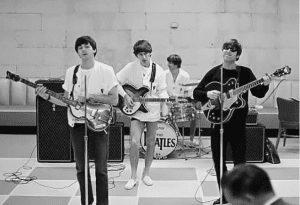Red Hot Chili Peppers Set to Sell Music Catalog for $300M-$350M

via joe_clark / YouTube
The Red Hot Chili Peppers are on the brink of finalizing one of the biggest catalog deals of the year. After months of negotiations, the band appears ready to sell their recorded music masters for a price hovering between $300 million and $350 million. It’s a massive figure even in a market that has seen legacy artists cash in on the value of their life’s work. What makes this notable is how quietly the band handled discussions while still attracting oversized offers from outside bidders.
The sale centers on the masters tied to the band’s 13 studio albums released under Warner Music Group. For decades, these records have consistently pulled in strong annual revenue, keeping the band’s catalog among the most valuable in modern rock. Investors and major labels have been hunting for catalogs with stable long-term earnings, and the Chili Peppers fit the profile perfectly. Their music still dominates streaming playlists and continues to anchor modern rock radio.
News of the deal broke through Bloomberg, with journalist Lucas Shaw detailing how the negotiation dragged on longer than expected. Billboard first reported the band was taking offers back in February, while the Financial Times later confirmed Warner’s interest in July. Despite several groups trying to outbid Warner — at least one floated as much as $375 million — the band’s team refused to open their financials to anyone else, signaling that the decision was about more than the highest check.
View this post on Instagram
Warner’s Big Push Into Catalogs
Warner Music Group has been pushing hard into catalog acquisitions, and the Chili Peppers deal fits neatly into that broader strategy. As part of its partnership with Bain Capital, Warner now has access to a joint $1.2 billion fund aimed at securing large, historically significant catalogs. Warner handles the marketing, administration, and distribution, while Bain supplies financial firepower. This arrangement has helped revive Bain’s presence in music investment after years of staying on the sidelines.
The Chili Peppers’ masters represent exactly the kind of long-tail asset that major players want. The band’s catalog reportedly brings in around $26 million annually, according to Music Business Worldwide. If Warner secures the rights to the early EMI releases as well, that adds roughly another $1 million in yearly revenue. For investors, that kind of predictable return is the main attraction — especially when the band remains active and continues to draw big live audiences.
This isn’t just about nostalgia. Modern streaming behavior has driven up the value of evergreen rock catalogs, and the Chili Peppers sit comfortably in that zone. Songs like “Under the Bridge,” “Californication,” and “By the Way” have become generational fixtures, and their streams have actually grown in recent years. Warner and Bain clearly see the potential for substantial long-term returns, especially with global distribution and marketing backing the catalog.
View this post on Instagram
Why the Chili Peppers’ Catalog Matters
The financial numbers alone help explain why this deal is so large, but the band’s history also plays a major role. Over four decades, the Red Hot Chili Peppers have built a catalog that blends funk, rock, and alternative music into something instantly recognizable. Their biggest albums remain staples of the streaming era, and younger listeners continue to discover their work. That kind of staying power is rare and adds weight to the valuation.
In 2021, the band sold their publishing rights to Hipgnosis Songs Fund for about $140 million to $150 million. When combined with the potential sale of the masters, their total asset deals approach half a billion dollars. That places them in the same league as Bruce Springsteen’s $500 million deal and just shy of Pink Floyd’s roughly $400 million valuation. These figures put the Chili Peppers firmly among the most valuable modern rock catalogs.
The band’s advisory team, led by lawyer Eric Greenspan and manager Guy Oseary, has been deliberate in shaping these agreements. By refusing to let competing bidders review the financials, they kept control of the narrative and aligned the sale with their long-term goals. They aren’t just cashing out — they’re securing an arrangement that allows them to maintain creative influence while letting a major music company handle the heavy lifting.
View this post on Instagram
A Market That Keeps Growing
Music catalog sales have surged over the past few years, and the Chili Peppers’ deal highlights why the trend isn’t slowing down. Catalogs are viewed as stable assets that produce reliable cash flow through streaming, licensing, film placements, and global distribution. For artists of the Chili Peppers’ stature, these catalogs can generate strong income well into the future, making them highly attractive to labels and investment firms.
The band’s decision to sell now reflects a combination of timing and market momentum. The global streaming market continues to expand, and interest in rock catalogs hasn’t cooled. Investors want material that will retain relevance for decades, and the Chili Peppers fit neatly into that long-term picture. Their songs cross generations and remain part of mainstream culture, which protects the value of the masters.
If the deal closes as expected, the Chili Peppers join a growing list of artists who have leveraged their legacy into unprecedented financial returns. But unlike some who sell everything, the band retains creative authority and the freedom to keep releasing new music. For them, this isn’t a farewell — it’s a strategic move in an industry that’s rapidly reshaping how artists manage their own history.












